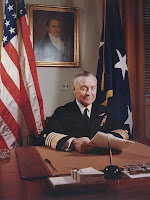Abstract: During World War II, the U.S. faced a burgeoning technological threat to its security with the advent of Germany’s unrestricted submarine warfare. The U.S. Navy faced this danger head on and stood up Tenth Fleet to protect allied shipping and convoys through the expanded use of intelligence and information to significantly diminish the U-boat threat. In 2009, the U.S. Navy reconstituted its Tenth Fleet to again confront a dangerous and growing threat, this time in cyberspace. Although cyberspace has greatly enhanced the way people communicate, conduct business and relate to each other, it has also allowed for some severe unintended consequences, namely the ability for state and non-state actors to use this domain to cause us harm. This modern cyber threat is growing rapidly and poses a serious risk to our nation’s economic and national security interests. This paper explores the historical roots of Tenth Fleet and the innovation and lessons learned during WWII to better enable the reconstituted Tenth Fleet to protect, deter and defend against the growing cyber threat.
Commander Albert Angel is the Executive Officer of Navy Information Operations Command Texas in San Antonio, Texas.
You can read his complete U.S. Army War College thesis Strategy Research Project HERE.
































